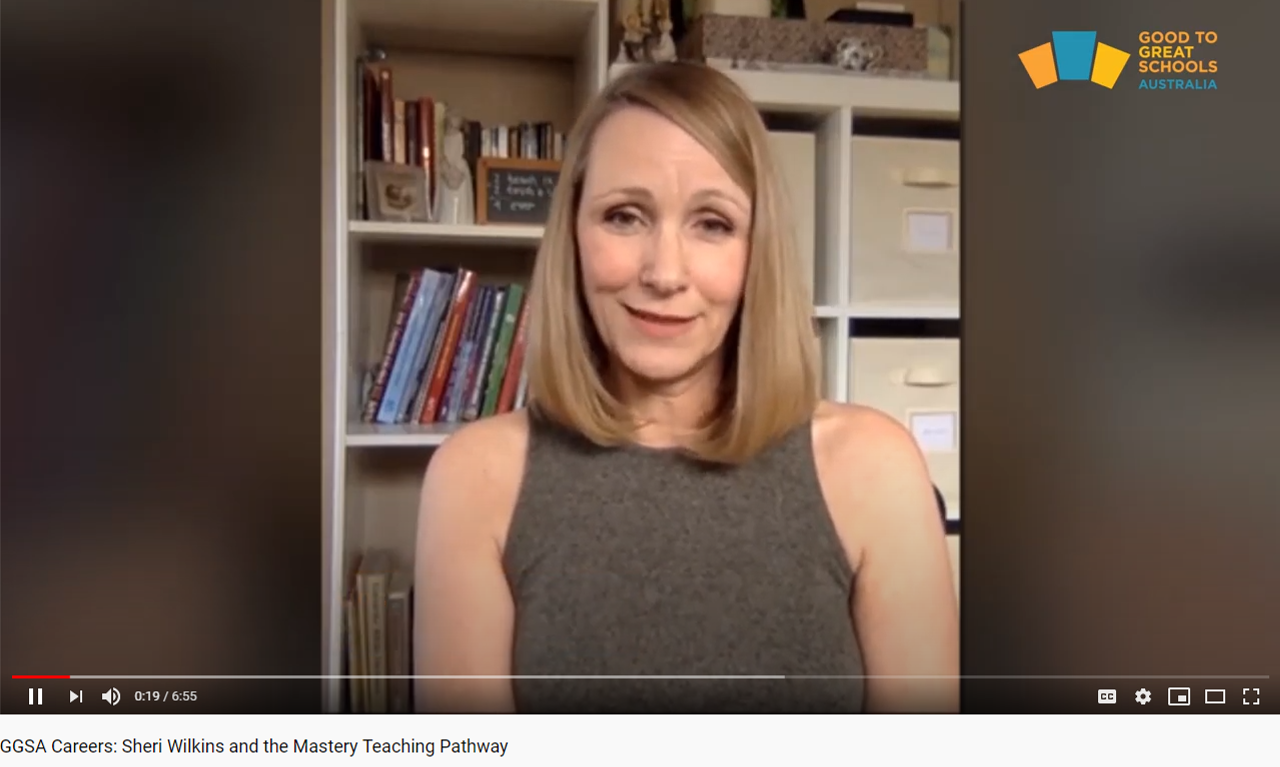
GGSA Careers: Sheri Wilkins and the Mastery Teaching Pathway
In this interview, Professional Development Coordinator Sheri Wilkins talks about the innovative projects and effective teaching pedagogy she is involved with in her role at Good to Great Schools Australia.
Innovative projects
Primarily I’ve been working on the mastery-teaching pathway, which is a system of professional development choices that principals, school instruction coaches, teachers and teaching assistants can engage in that will give them a phenomenal knowledge base into effective teaching and how to engage in continuous school improvement that is centered around student mastery and student learning. And as they complete these modules, they will be able to receive certification, and they will take assessments that will show that they’ve mastered the content. And at the end they’ll be able to demonstrate that they have mastered the concepts of effective teaching and school change really centered around effective teaching.
Engaging experts
So I’ve been engaged in the field of education for many, many years. I have been a teacher and a teaching coach. I have worked as an administrator at a regional office and I’ve coordinated staff development and professional development for hundreds of schools.
I’ve also done work over the last three decades or so around the area of Direct Instruction. I’m a Direct Instruction trainer, coach and implementation manager and I believe strongly in Direct Instruction and I have used it in the classroom and I’ve used it with loads of teachers and students and I’ve seen lots of good things happen.
Finally, I’ve got an advanced degree of a PhD from a university in the area of education, and my specialisation was in education research and working with students who struggle in school. So that’s where my area of expertise is.
Making a difference
I’m excited about that. I’ve enjoyed, I have an amazing team with whom I work. I enjoy the exciting kind of work that we’re doing, and more than anything I love being involved in work that will make a difference for students and for families and for entire communities. So I love the fact that we are, that I’m working with like-minded people who have a passion for making a difference for children.
Effective teaching pedagogy
Direct Instruction is a method of teaching that is based in the area of behaviourism. So it’s a type of very explicit and specific teaching that leaves nothing up to chance. Direct Instruction has been around since the sixties in the United States. Doug Carnine started some research around Direct Instruction, Zig Engelmann really took off with it and developed programs with his associates at the University of Oregon and, here in the States. And what I love about Direct Instruction is that it is designed so that every child who works through the programs and Direct Instruction, they achieve mastery. It really is focused on that mastery of content. And so we don’t just present a lesson and hope that the children get it and then go onto the next lesson. Because, well, we presented that lesson and they should have learned it. No. All along we’re assessing for mastery. We’re checking to make sure that they’re understanding what we’re doing. We are assessing them regularly, but not just, not to give a grade or to say, oh, you’ve done well or you know, you really did not very well on that. No. To determine if I as a teacher have done what I need to do and whether or not I need to provide remedies and reteach and then retest.
So I have worked with over the years, probably thousands of students, thousands of children who struggle with learning with Direct Instruction. And I just have never found anything as powerful and as effective for all kinds of children, whether they come from big cities, small cities, rural communities, remote communities, what kind of families they come from, what kind of learning background they have, it just works, and it works with every student.
Challenging but rewarding
So I think it’s challenging to explain to educators why they might want to do something differently. So, many educators don’t know much about Direct Instruction or they may have misconceptions about Direct Instruction, and so they don’t even want to give it a try or they’re very hesitant to give it a try. And so it can be really difficult at times and very challenging to help people understand, or help educators to understand why Direct Instruction is as amazing as it is. And so the reward from that is when we have that opportunity to talk to somebody and convince them that they might want to give this a try, right and so they try Direct Instruction. They don’t really think it’s going to work. They think that things were, you know, it was much better the way they were doing things before. And then they realize the magic that they experience when students are learning and they’re engaged and the students are excited about learning and the teachers excited about teaching. And I’ve had so many teachers tell me that Direct Instruction has saved their career, that they were really kind of burned out on teaching. But once they started using Direct Instruction that it has changed their whole way of looking at their job and it’s so rewarding. So for me as a professional developer and a coach, that’s what I find really rewarding as well.







Sorry, the comment form is closed at this time.